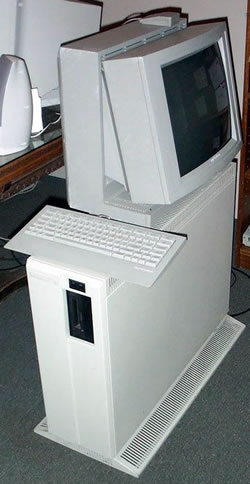
Flashback
November 2001: “There’s the matter of these $1200 in long-distance calls to London, England, Mr. deVilla,” said the Bell Canada rep.
I looked over my shoulder at my housemate, who was already three months behind with his share of the rent. Three months, three thousand dollars. Luckily, I’d been good at saving money, so I wasn’t in dire straits just yet.
“Dude, those calls were for a big job interview. I’ll make so much money on this security gig that I can pay you back with my first paycheque.”
“So,” I said, turning my attention back to the Bell Canada rep on my cellphone, “how do I get my land-line reactivated?”
“You’ll have to pay all outstanding charges and we’d also like you to leave us a $500 deposit.”
“Okay,” I grumbled, giving my housemate the evil eye as I reached for my wallet. “Here’s my credit card number…”
January 2002: I got two long distance phone calls on the day I got fired from OpenCola. The first was from my friend and co-worker Cory Doctorow, who was slowly being pushed out of the company he founded by the new regime himself. He wasn’t involved in my firing, and he didn’t owe me a call all the way from San Francisco, but he did it anyway. It was a nice gesture, and I was grateful.
The second call came from my deadbeat housemate, who had gone home for Christmas. He was overdue to return.
“Dude,” he said, “I’m so short money I can’t even afford to come back.”
I imagined even more months of unpaid back rent, and the warning from OpenCola founder John Henson kept playing over and over in my head: “I don’t think you’ll ever get that rent money back.”
Faced with the prospect of having to live on my severance pay and savings, the last thing I wanted to deal with was this parasite.
“I don’t think you should come back,” I said.
There was a moment of silence from the other end of the line, followed by an “I understand,” which was then followed by “Can you send me my stuff?”
“How ’bout sending me the laptop you borrowed from me?”
“I need it to help find work.”
“Well, I’m not sending your stuff. It’s my guarantee that you’ll eventually pay me.”

February 2002: “Dude, I think I can get you a cheque shortly.” No cheque appears.
March 2002: “Dude, I think I can get you a cheque shortly.” No cheque appears.
April 2002: “Dude, I think I can get you a cheque shortly.” No cheque appears.
May 2002: “Dude, I think I can get you a cheque shortly.” No cheque appears.
June 2002: “Dude, I think I can get you a cheque shortly.” No cheque appears.
July 2002: “Dude, I think I can get you a cheque shortly.” No cheque appears.
August 2002: “Dude, I think I can get you a cheque shortly.” No cheque appears.
September 2002: “Dude, I think I can get you a cheque shortly.” No cheque appears.
October 2002: “Dude, I think I can get you a cheque shortly.” No cheque appears.
November 2002: Although I’d landed a job while on a date back in May, the company had run out of money by August, and clients were few and far between. Over a year had passed since my deadbeat ex-housemate had started defaulting on the rent.
I gathered the stuff he’d left behind in the dining room. It filled the room: software, books, computer peripherals, and even expensive little techno-trinkets such as a Sony MiniDisc player and an iPaq PDA, complete with folding keyboard.
“Time to kill the hostages,” I said to myself as I announced the “Save Joey’s Christmas” sale online. I made a quick $2000.
I didn’t sell everything — I held on to what I thought he’d value most: his collection of computer security books and what was probably a prized possession: a Symbolics XL1200 Lisp machine.
A Little Background
When I was in high school back in the 1980s, one of the big tech buzzwords was “Fifth Generation Computing”. If vacuum tube computers like ENIAC were first-generation computers and microcomputers (computers with microprocessors, which were relatively new back then) were the fourth generation, the fifth generation represented the next generation of computers, as envisioned at the time.
The Japanese were the first to use the term “fifth generation”, and they used it to name an initiative to develop next-gen computers. You must remember at the time that it seemed as if the Japanese could achieve anything they wanted to: they’d gone from humbled war loser and surpassed the American at their own games of autos and electronics. It even looked as if they were making cultural inroads, with businessmen latching onto Japanese management practices, anime making its first forays onto our TV screens with the Transformers, Star Blazers and Robotech and sushi. AI was going to be yet another Japanese success story.
 (In these times, when it’s not unusual to find sushi for sale at your neighbourhood convenience store, sushi is no longer considered to be really exotic. That wasn’t the case back then. Go rent The Breakfast Club and watch for the scene in which Molly Ringwald pulls out her sushi lunch — everyone looks at her as if she’s crazy.)
(In these times, when it’s not unusual to find sushi for sale at your neighbourhood convenience store, sushi is no longer considered to be really exotic. That wasn’t the case back then. Go rent The Breakfast Club and watch for the scene in which Molly Ringwald pulls out her sushi lunch — everyone looks at her as if she’s crazy.)
One of the big features of fifth generation computing was artificial intelligence, or “AI” for short. It was expected that with the new generation of computers and software that the Japanese were going to build, we’d be able to communicate and program our computers using what we geeks call “natural language” — that is, the way we speak every day, as opposed to using cryptic commands or programming languages. For a while, AI was considered to be a hot field, and AI classes at university were always the first computer science classes to fill up.
Symbolics was a company that attempted to capitalize on the AI craze of the 1980s. A a commercial spin-off of the AI lab at MIT, it produced state-of-the-art computers that used a programming language called Lisp as their core programming language. Because Lisp is such an advanced programming language — so advanced that even today’s programming langauges are still stealing tricks from it — and because it’s so flexible, it was often used for artificial intelligence work. The XL1200, released some time in the late 1980s, was probably the top-of-the-line machine produced by Symbolics until they got out of the stand-alone machine business. It had windows and a mouse back when most of us were still looking at DOS screens, and megabytes of RAM back when home machine RAM was measured in kilobytes.
The Symbolics XL1200 Lisp Machine
The Symbolics XL1200 is the machine pictured at the top of this article.
According to this page, its main case has a height of 64cm (about 2 feet), width of 24cm (about 9.5 inches) and a depth of 81 cm (about 32 inches); this page says that it weighed 150 pounds in its crate, not counting the 19″ monitor, keyboard (so solidly built and encased in steel; you could easily bludgeon someone with it) and other components, which weighed 90 pounds on their own. It certainly felt that heavy the time I had to move it.
When my deadbeat ex-housemate last booted up the machine, a little icon and the words “HARDWARE ERROR” appeared on the screen. The fact that it displays a diagnostic message suggests that all is not lost; if someone were willing to go over its numerous circuit boards with a logic probe, he or she may be able to diagnose and fix the problem. Alternately, someone out there who already owns an XL1200 could use it as a source for replacement parts.
It sat safely in a closet in my old house for three years and it’s been sitting in the storage locker of my condo for the past 18 months. It is in good condition, and aside from being put into the storage locker when I moved to the condo, it hasn’t been touched.
It’s For Sale
Five and a half years have passed since my deadbeat ex-housemate defaulted on paying the rent. I’ve accepted the fact that he’s very unlikely to pay me, so it’s time to sell off the last of his stuff. First up on the selling block is the XL1200.
This machine, while rare and of considerable historic value, isn’t of much use to me. I’ve never been able to wrap my brains around Lisp, but should I choose to do so, I think I’d rather download a Lisp interpreter into my laptop than work on this big beast. However, I know that somewhere out there, a Lisp maestro or computer historian (or someone’s who’s both) is looking for such an XL1200.
If you’re interested in getting a look at this beast of a machine, please drop me a line at joey@joeydevilla.com. If you know someone who might be interested in such a thing, send them my way. Spread the word far and wide: Joey deVilla has a Symbolics XL1200 for sale.


 (In these times, when it’s not unusual to find sushi for sale at your neighbourhood convenience store, sushi is no longer considered to be really exotic. That wasn’t the case back then. Go rent The Breakfast Club and watch for the scene in which Molly Ringwald pulls out her sushi lunch — everyone looks at her as if she’s crazy.)
(In these times, when it’s not unusual to find sushi for sale at your neighbourhood convenience store, sushi is no longer considered to be really exotic. That wasn’t the case back then. Go rent The Breakfast Club and watch for the scene in which Molly Ringwald pulls out her sushi lunch — everyone looks at her as if she’s crazy.)